- Home
- Peter Grainger
A Private Investigation Page 7
A Private Investigation Read online
Page 7
The grass verge at the entrance to the playpark had been made soft by all the rain, so he pulled onto it carefully, keeping the two offside wheels on the tarmac. The window wipers kept going when he stopped the engine but it looked as if the rain was easing a little. He’d wait a couple of minutes more, just to see.
Waters and Butler had arrived back at half past four and at five o’clock there had been a meeting of sorts. But DCI Reeve hadn’t put in an appearance and Smith was annoyed about that, not that there was any point. John Murray had poked his head around the door and told them he was needed down downstairs where Wilson’s team were processing the day’s haul of shoplifters. That was the last Smith had seen of him.
Waters had Gemma Powell’s address and also the idea that they should speak to her again, away from the school, which was spot on, but DI Terek didn’t say, as Smith would have done, go on, then. Waters also had the names of three other girls with whom Zoe had been friends, all from her class, but the detective inspector again pointed out that she hadn’t been missing for twenty-four hours. He seemed to be fixated on this number, and Smith had to wonder whether it was a new protocol that he had missed. When Serena said she could do an extra hour tonight and take a look at Zoe’s phone account, Smith made a point of looking at his watch – he’d been tempted to say she ought to wait until 20.30, when it would definitely be twenty-four hours since the girl had sent her last message from the playpark.
There was a streetlamp on the opposite side of the road, lighting up the notice at the entrance to the playpark. This notice listed all the things one was not allowed to do once one had passed through the gates. It was, therefore, quite a large and wordy sort of notice, but it had many tiny holes in it, made by a succession of air rifle pellets over the years. Presumably the department of writing notices at the local council had forgotten to add the order not to fire guns at this notice.
Zoe Johnson would have walked in through that entrance last night – it was the only one and there was no reason to doubt that when she sent the text to Gemma Powell, she was waiting here. It was dark beyond the notice and she had probably been alone at that moment. If she had had company, why send the text to the other girl? So Zoe walked into the park, not afraid because she had grown up on this estate, she knew this place well and nothing bad had ever happened to her here. She waited for the older girl, thinking or at least hoping that the arrangement had been a firm one; then she sent her texts. But by that time Gemma was eating her tea with her mother down at the pizza parlour, and not giving Zoe Johnson another thought.
And then? The second text had said she would go into town, still imagining that Gemma might want to meet up with her. The nearest part of the town proper to the Dockmills was the area called The Crescent. One could go back across the Dockmills, get onto the Lakenham road and walk into town from that direction, which would take at least twenty minutes, or one could go down onto the old railway line from the other side of the playpark and head due south – that would take less than ten minutes if you knew the way.
Smith got out of the car. It was cold but the wind had dropped and the rain had diminished to a fine drizzle. In the boot of the car he found the heavy rechargeable torch, a pair of wellingtons and a lightweight waterproof jacket; if you don’t have the right basic gear in the back of your car after thirty years in the job, you’ve probably been in the wrong job. He put on the wellingtons and the jacket, and swung the lid of the boot down. Then, instead of setting off immediately, he waited, making a show of checking his watch and fastening the jacket, because there was a face in the gloom beyond the noticeboard. The lights of the car and the noise he had made had attracted someone’s attention.
Whoever was there made no move to come forward, and Smith considered the options. It might be a nervous dog-walker wondering whether to come past the bloke hanging around at the entrance to the park – understandable, but dog walkers tend to be creatures of habit, visiting the same places at the same times on a daily basis. Just the kind of person he needed to be having a word with tonight. There was nothing else for it but to switch on the torch and advance in an official capacity.
The torch was a powerful one, and the boy held up a hand in front of his face. Behind him, further back in the park, Smith could see two others. Shining the torch down a little, Smith kept moving forward until only a few yards separated him from the first youth, who was twelve or thirteen years of age, no more.
‘Now then. What are you lot doing out here on a night like this?’
‘Minding our own business. What are you doin’? This place is for kids, mister. You some sort of pervert?’
This was encouraging. Communication with the natives had been established without the use of abusive language or physical violence, and they were showing an interest in his work.
‘No, I’m not. Let me give you a useful tip, sonny. In my experience, perverts rarely go about their business waving a 400 lumen torch in front of them.’
The other two boys came forward – one was of a similar age to the first, the other was younger and smaller. None of them should have been out after dark on a winter’s night in a sane world, and none had a coat either. But then, of course, that was normal now. How many times had he driven past groups of pupils waiting at school bus stops on wet mornings and noted that barely one in twenty had what he would describe as suitable apparel?
‘You lost somethin’ then? Lost your dog? You want us to go into the bushes and help you look for him?’
Plainly, the idea was fixed pretty firmly in the boy’s mind. This was rather sad but Smith decided that he would reflect upon it later. He reached into the pocket of his jacket, found his ID, and stepping forward he shone the torch down at it.
‘I’m a detective sergeant from the police station in town. I haven’t lost my dog, I’m looking for a young girl who didn’t come home last night. Any of you lot happen to be here yesterday evening?’
The first boy studied the ID card more carefully than most adults. Then he looked up at Smith and said, ‘Is this about Zoe Johnson?’
There was no mystery. The two older boys attended the community college, and their form tutors had read out a message before afternoon school; Smith asked them what the message said because he didn’t know and they told him. Anyone who saw Zoe after school yesterday or who thinks they know where she might be should tell their tutor or come to the main office at the end of school.
In answer to Smith’s question, they told him they hadn’t been here last night, and they didn’t know anyone who had. But yes, they knew Zoe, and they had seen her here in the past, it was one of the places she used to hang around in. Who with, he’d said – there are times when the objective case pronoun must be sacrificed for the sake of an investigation but he still winced inside – anyone in particular? The reluctance to name names, however, is a survival skill in places like the Dockmills, and the boys shrugged as if they didn’t know. Smith knew better than to pursue it.
He suggested to them that they ought to be off home now, but their interest in police work seemed to have grown. The first boy said, ‘You lookin’ for her on your own, then? We could help, couldn’t we?’ with an appeal to the others, who nodded.
It was one of those DCI Miller moments, the flat northern vowels of his first boss saying “Ee, if you didn’t laff, you’d bloody weep!” Smith thanked the boys sincerely but said he’d have to decline their generous offer. Then the youngest one piped up and said, ‘Well, shouldn’t you have dogs an’ that? What about the chopper with the infra-red camera?’
They seemed to have more idea than some senior detectives. He explained again that for now he was only visiting the places where Zoe might have been last night, and that the proper search hadn’t begun yet – for all he knew, he said, she was already back home with her mother.
The first boy said, ‘Want us to watch your car for you, then?’
‘Oi! I’m not giving you lot an excuse to stay out late. Do you think it’ll still be in one pi
ece when I get back, though? It’s a very valuable car, a classic early model.’
The boy appraised it, taking his time before saying, ‘No it ain’t, it’s a heap of junk. But we’ll keep an eye on it, won’t we?’
The three boys were standing together now, and the small one was nodding. Smith thought that he had probably worked with worse teams over the years.
He didn’t spend long in the playpark itself. There were swings, a slide, a miniature roundabout, two climbing frames, a wooden tower and a metal horse and elephant mounted on springs for small children to ride. All the equipment had the regulation rubbery tarmac to allow for life’s inevitable falls, but for quite a while no-one had been tasked with clearing up the inevitable debris of modern urban existence. It was drearily predictable – the empty cans and bottles, cigarette packets – how on earth do they afford them now? – the discarded wrappers of every fast-food brand known to mankind, and around the edge of the play area the discarded wrappers of those first magical sexual experiences.
Smith stood in the centre for a moment and switched off the torch. He tried to picture Zoe Johnson here last night. Maybe she sat on the swings for a few minutes, texting Gemma Powell and waiting in vain for a reply. Last night was just as cold as this one, and there had been showers. Why didn’t she go home? Were there more serious problems than Ann Crisp had suspected this afternoon? Or was she just at that age when everything is boring except perhaps risking your neck wandering around the town after dark? Serena Butler was working on the phone instead of going home; maybe they would soon know whether Zoe had sent other texts or called someone, arranging to meet.
With the torch switched on again, he made for the side of the playpark that bordered the old railway footpath. He found the well-used exit and began to pick his way carefully down the slope, but not carefully enough. Halfway down, his boots slipped on the muddy surface, and he slid the rest of the way, only staying upright by putting out his left hand. When he reached the bottom, he could feel the stinging tingle of nettles on the backs of his fingers.
He turned left as the girl would have done if she had headed for the town, swinging the beam of light left and right so that the steep slopes of the old railway embankment were illuminated. When he passed under a tall ash tree, there was a clatter of wings above his head as roosting wood pigeons fled into the darkness. After that, the bushes grew more thickly until they had enclosed the path in a tunnel of thorns, and he had to push his way through with some care. There was a moment of doubt – surely the girl would not have come this way – but when he stopped and shone the torch down, there were many footprints. If she did, she certainly wasn’t the only one.
Before long, the path opened up again and the first lights were visible. This was The Crescent, one of the outlying local centres that large towns have, where some conjunction of highways and byways forms a ganglion, a cyst of nervous activity and city lights. Smith was thirty yards short of the road, clambering over a broken-down fence, when his phone began to ring, and he thought, good timing, Detective Constable Butler.
‘Hello? Where are you? I rang your landline first, thinking you’d be home by now.’
It was Jo.
‘No, still at it. A nocturnal community relations exercise with the deprived and disaffected youth of Kings Lake. You’re the expert – which comes first, the deprivation or the disaffection?’
‘Alphabetically, deprivation. After that, I couldn’t say. Are you serious? This is what your team’s up to on a Tuesday night?’
‘No team involved, it’s an individual initiative.’
‘Oh, I see. What are you really doing?’
She could read between his lines pretty quickly now. He stood in the amber half-light from the nearby road, getting his breath back, and told her about the missing girl. Her first question was “How old?” and her second was “At risk?”, to which he gave a non-committal answer, but she knew anyway.
She hadn’t forgotten their conversation at the weekend either, and she said after a pause, ‘Odd that one of those should come up now, of all times.’
‘Yes, I know. But a life without irony isn’t worth living, if you ask me. What are you up to, anyway?’
Sometimes these days she rang him for no particular reason, and he had decided he didn’t mind that, but tonight she told him she was now visiting Cambridge this coming Friday, a sort of informal interview at her alma mater. She didn’t have any commitments at the weekend, so she could come up to Lake again on the train as she would be more than halfway there anyway. They could continue the work they had begun on the notes for the Andretti book, if he wasn’t busy himself.
He said, ‘That sounds good. Text me the time the train arrives and I’ll pick you up from the station,’ and she replied that she would. She ended with ‘Take care out there,’ as if they had been doing and saying these things for years.
Standing at the nearest end of The Crescent, he pictured Zoe Johnson walking along the row of shops and businesses that formed its outer edge. It must have been about nine o’clock if she had indeed come this way last night. The shops were shut, apart from an off-licence-come-general-store, but he could see a kebab place and further down a couple more takeaways. There was a taxi rank with three or four vehicles present, and two of those at least belonged to Dolly Argyris’s ABC business, which might be handy. Over the road was an extended layby with several bus stops – and the girl might have taken one and gone almost anywhere in the town from here – and behind those was a set of railings enclosing a desolate square of grass pretending to be an urban green space.
His phone buzzed with a text, and this time it was Serena, apologising because she could not get into that phone account until tomorrow morning – one of the rare occasions, Smith reflected, when she had not been able to do so quickly. He sent a brief reply, and returned the phone to his pocket, his mouth drawn into a brief twist of annoyance. This thing would just not get moving – he had forgotten to get the picture onto his phone and so there was little point in talking to anyone here tonight. But if he had any say in the matter, at least a couple of detective constables would be doing some door-to-door here tomorrow morning, and maybe even a detective sergeant.
Getting back up the slope into the playpark wasn’t straightforward; he had to put away the torch and scramble up, acquiring more nettle rash and muddy hands along the way. At the top, he checked the time and saw that it was almost eight o’clock – in just thirty minutes, Detective Inspector Terek might send the search for Zoe Johnson into overdrive. Terek was commuting from Huntingdon every day, which was fair enough while you found a place, but was he moving up here? No-one seemed to know, but you can’t call it your patch until you’re living in it, that much he did know. Old Jack Miller always used to say-
Smith stopped twenty yards short of the exit from the playpark. Now he was the face in the darkness, looking out at the two figures standing close to his car. One was the boy, the first boy he had spoken to, and the other was a woman hunched inside a parka-style coat with the hood up and her hands in the pockets. If these two had had a conversation it was over now – they seemed to be waiting in silence for the owner of the car to return.
At that moment, Smith would have bet you his customary fiver that he knew who she was, and he would have won, though it is a matter of some dispute as to whether he ever collected his winnings in all the wagers he had made over the years, or whether he ever paid out in those he had lost.
The boy said, ‘Here he is. This is ’im.’
The car was in one piece, and Smith thanked the boy – he knew full well that there were children on the Dockmills who could have disabled it in a matter of seconds. The cost of a new set of tyres and headlights might have brought the old girl’s service to a premature end.
When he turned his attention to the woman, she said, ‘Well, I’m glad your bloody car’s alright. That’s the important thing, innit?’
Smith said, ‘I’m Detective Sergeant Smith, from Kings Lake Cen
tral police station.’
Over the years, that had become something more than a statement of fact. The woman looked at him, seeing no reaction whatsoever to her opening words – only a level, patient waiting for her to say something more constructive, something that would enable them to move forward.
‘Alright… Just you, is it? One copper?’
‘For now. Other people are busy at the station. Can I confirm that you are Zoe’s mother? You are Penny Johnson?’
She nodded, not trusting herself to speak for the moment – something else he had seen too many times.
‘You’ve had my colleague, police officer Ann Crisp with you today. Is she still at the house, Mrs Johnson?’
‘No. She went a little while ago. She gave me the name of someone else I could ring if… If anything happened.’
‘Good. May I ask who’s with your other children?’
‘Roy. Roy’s at the house. He just came in. I had to get out for a few minutes, I been shut in all day, couldn’t bear it. I needed to get out, and I thought while I was I’d…’
Smith turned to the boy and said, ‘It’s getting late, son. Your own mother will be worrying, won’t she?’
Under normal circumstances the suggestion might have produced a scornful laugh, but the boy was old enough to understand, old enough to realise that the woman who was the mother of a girl he knew was now crying in the street. Maybe, just for a moment, he did think about his own mother waiting at home – at any rate, he nodded to Smith and left without another word.
‘Mrs Johnson, you came out to look for Zoe. Why here? What made you come down to the playpark?’

 Persons of Interest
Persons of Interest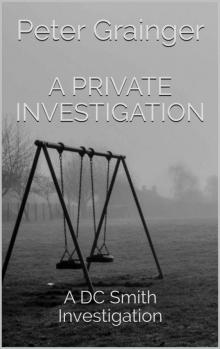 A Private Investigation
A Private Investigation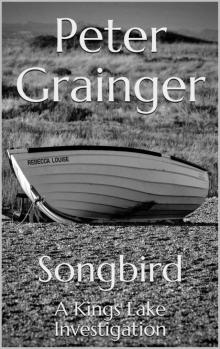 Songbird
Songbird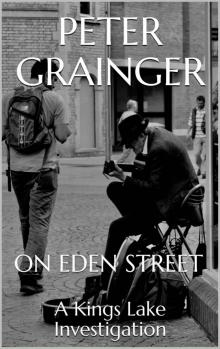 On Eden Street
On Eden Street An Accidental Death
An Accidental Death Time and Tide
Time and Tide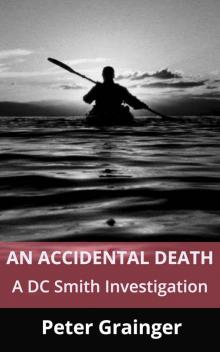 An Accidental Death: A DC Smith Investigation
An Accidental Death: A DC Smith Investigation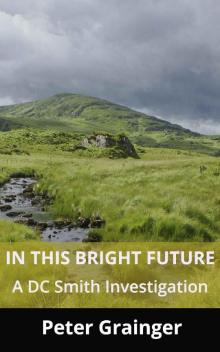 In This Bright Future
In This Bright Future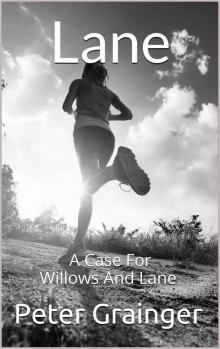 Lane: A Case For Willows And Lane
Lane: A Case For Willows And Lane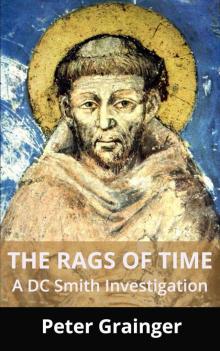 The Rags of Time: A DC Smith Investigation
The Rags of Time: A DC Smith Investigation Luck and Judgement
Luck and Judgement Persons of Interest: A DC Smith Investigation
Persons of Interest: A DC Smith Investigation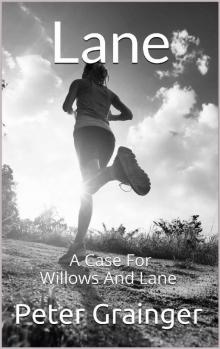 Lane
Lane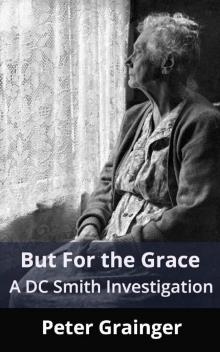 But For The Grace
But For The Grace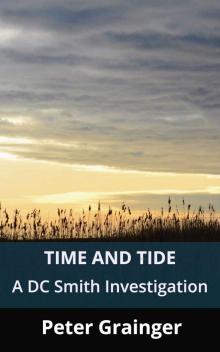 Time and Tide: A DC Smith Investigation
Time and Tide: A DC Smith Investigation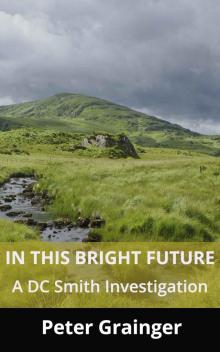 In This Bright Future: A DC Smith Investigation
In This Bright Future: A DC Smith Investigation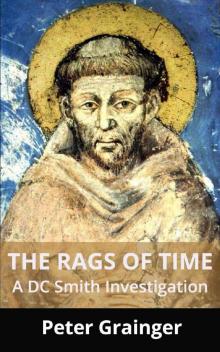 The Rags of Time
The Rags of Time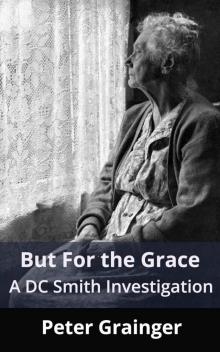 But For The Grace: A DC Smith Investigation
But For The Grace: A DC Smith Investigation Luck and Judgement: A DC Smith Investigation
Luck and Judgement: A DC Smith Investigation